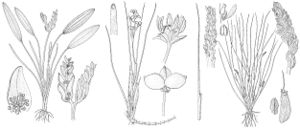Difference between revisions of "Scheuchzeriaceae"
imported>Volume Importer |
imported>Volume Importer |
||
| Line 53: | Line 53: | ||
|publication year= | |publication year= | ||
|special status= | |special status= | ||
| − | |source xml=https:// | + | |source xml=https://bitbucket.org/aafc-mbb/fna-data-curation/src/2e0870ddd59836b60bcf96646a41e87ea5a5943a/coarse_grained_fna_xml/V22/V22_203.xml |
}}<!-- | }}<!-- | ||
-->[[Category:Treatment]] | -->[[Category:Treatment]] | ||
Latest revision as of 20:29, 5 November 2020
Herbs, perennial, rhizomatous, caulescent; turions absent. Leaves alternate, emergent, sessile; sheath with remains often persisting, auriculate; blade linear, nearly cylindric, with conspicuous round pore adaxially on leaf tip; intravaginal squamules hairs, numerous. Inflorescences terminal, bracteate racemes, not subtended by spathe; pedicels following fertilization elongating, not spiraling. Flowers bisexual; subtending bracts present; perianth present; tepals 6; stamens 6, epitepalous; anthers basifixed, distinct, dehiscing longitudinally, extrorse; pollen globose; pistils 3(–6), distinct to slightly connate at base; ovules basal-marginal, anatropous. Fruits follicles. Seeds 1–2(–3).
Distribution
Colder parts of the Northern Hemisphere.
Discussion
Scheuchzeriaceae have sometimes been included in Juncaginaceae. That Scheuchzeria represents a family by itself is accepted by the majority of post-1940 workers (J. W. Thieret 1988).
Genus Genera 1, species 1:
